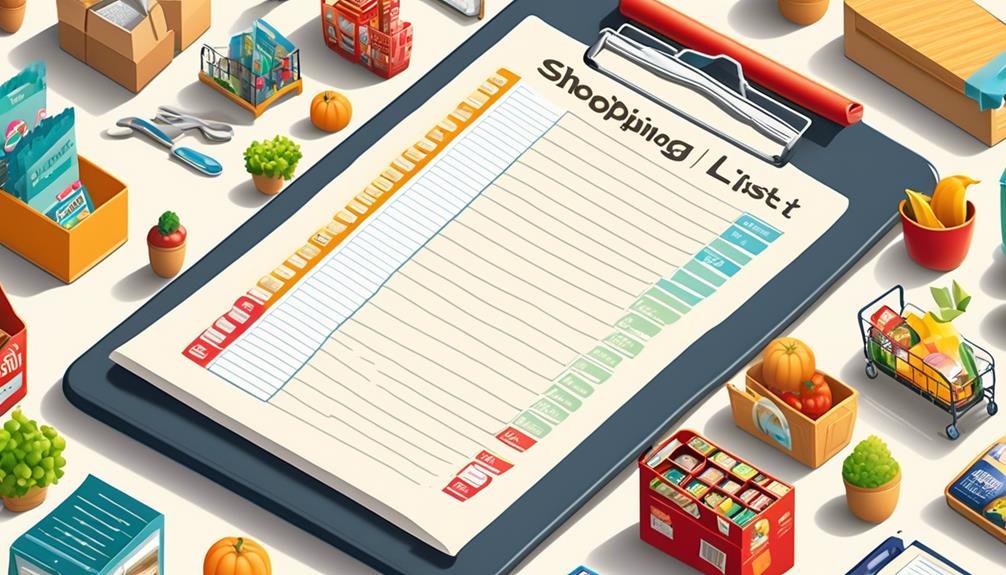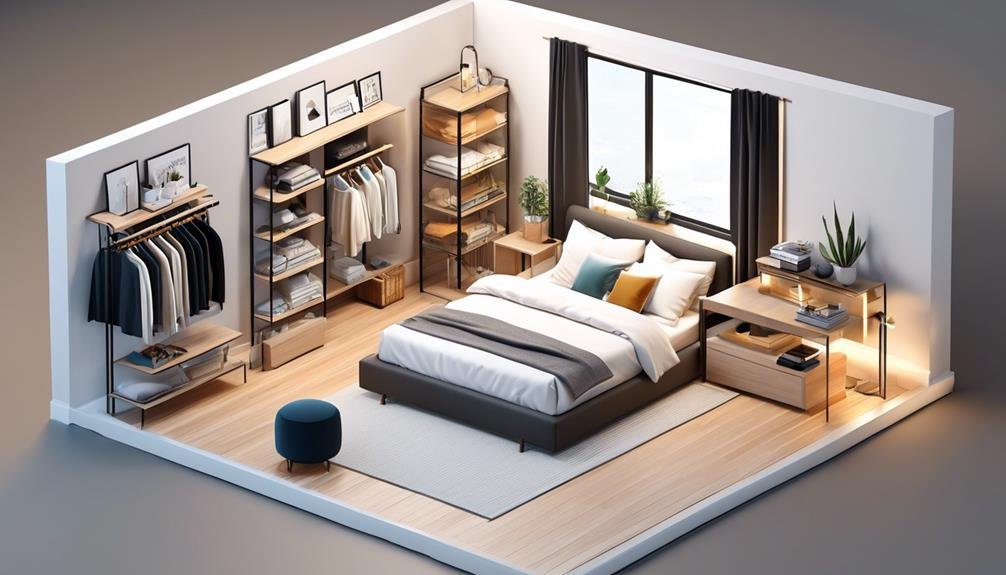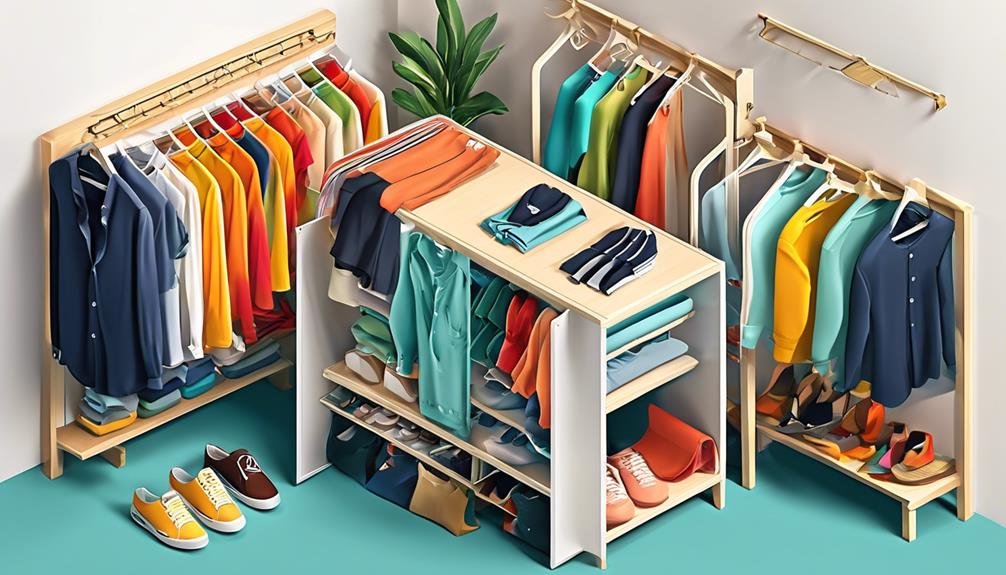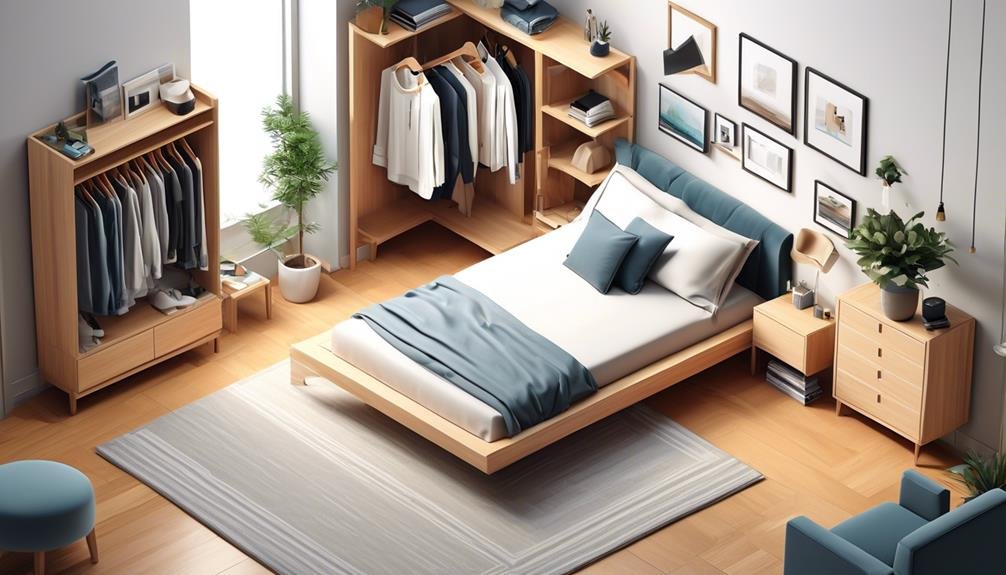So, you've come to realize that your shopping habits have led to an ever-growing collection of clutter in your home. It's time to take a step back and evaluate how you can make some adjustments. But where do you start? How do you break free from the cycle of accumulating more stuff?
Well, fear not, because in this discussion, we will explore some practical strategies and techniques that can help you regain control over your shopping habits and avoid adding to the clutter. From identifying your triggers and impulse buys to implementing a one-in-one-out rule, we'll delve into various approaches that can bring a sense of order and simplicity to your life.
So, let's get started.
Key Takeaways
- Assess the frequency of shopping trips to avoid unnecessary purchases and clutter accumulation.
- Examine purchases for value and necessity to make informed decisions and avoid impulse buying.
- Set a budget and stick to it to avoid overspending and accumulating clutter.
- Explore alternative shopping options such as second-hand stores, borrowing or renting items, and supporting local artisans to reduce clutter accumulation.
Evaluate Your Current Shopping Habits
To evaluate your current shopping habits, take a step back and assess how your purchases align with your need for a clutter-free lifestyle. Start by examining the frequency of your shopping trips. Are you buying things on impulse or out of habit? Consider whether these purchases truly add value to your life or if they're simply contributing to the accumulation of unnecessary items.
Next, analyze the types of products you tend to buy. Do you often purchase things that serve a specific purpose or do you find yourself buying items that are redundant or rarely used? Be honest with yourself about whether these purchases are truly essential or if they're just adding to the clutter in your home.
Furthermore, evaluate the amount of money you spend on shopping. Are you frequently overspending on items that you don't really need? Consider setting a budget and sticking to it to prevent impulse buying and unnecessary expenditures.
Lastly, reflect on the emotional aspect of your shopping habits. Are you using shopping as a way to cope with stress, boredom, or other emotions? If so, seek healthier alternatives to address these feelings rather than relying on shopping as a temporary distraction.
Identify Your Triggers and Impulse Buys
Identifying the triggers and impulse buys that lead to clutter is essential in adjusting your shopping habits. By understanding what drives you to make unnecessary purchases, you can take steps to avoid accumulating new clutter.
So, how can you identify your triggers and impulse buys?
Firstly, take a moment to reflect on your past shopping experiences. Think about the times when you made impulsive purchases or bought things you didn't really need. Were there any specific situations, emotions, or environments that influenced your decisions? For example, you might find that you tend to buy more when you're feeling stressed or when you're surrounded by sales promotions.
Next, pay attention to your thought process before making a purchase. Are you buying something because it's on sale or because you genuinely need it? Try to distinguish between wants and needs. Ask yourself if the item will truly add value to your life or if it will just contribute to clutter.
Another helpful strategy is to create a list before going shopping and stick to it. This can help you stay focused and avoid impulsive purchases. Additionally, consider setting a budget for yourself and only carry the amount of cash you're willing to spend. Leave your credit cards at home to prevent overspending.
Create a Shopping List and Stick to It

Reflecting on your triggers and impulse buys can help you transition into creating a shopping list and sticking to it. By understanding what prompts you to make impulsive purchases, you can take steps to counteract those tendencies and make more deliberate choices.
To create an effective shopping list, start by taking inventory of what you already have. This will prevent you from buying duplicates or unnecessary items. Next, think about your needs and prioritize them. Consider what items are essential and what can be postponed or eliminated altogether.
Once you have a clear idea of what you need, write it down on a physical or digital shopping list. Having a list will help you stay focused and prevent you from getting sidetracked by tempting but unnecessary items. When you go shopping, bring your list with you and stick to it. Resist the urge to deviate from the list unless it's absolutely necessary.
To further enhance your shopping list strategy, consider setting a budget. Having a predetermined spending limit will help you make more conscious decisions and avoid overspending. Additionally, try to limit your shopping trips to avoid unnecessary temptations.
Creating a shopping list and sticking to it's a practical and effective way to avoid accumulating new clutter. It allows you to be more intentional with your purchases, save money, and maintain a clutter-free living space.
Practice Mindful Shopping Techniques
When practicing mindful shopping techniques, be intentional about your purchases and make conscious decisions to avoid unnecessary clutter. Mindful shopping involves being aware of your needs and wants, and making thoughtful choices that align with your values and goals.
Here are some practical tips to help you practice mindful shopping:
- Evaluate your needs: Before making a purchase, ask yourself if you truly need the item. Consider its usefulness and whether it aligns with your lifestyle and priorities.
- Avoid impulse buying: Resist the urge to buy on impulse. Take a moment to pause and reflect before making a purchase. Ask yourself if you truly need the item or if it's just a fleeting desire.
- Research and compare: Before buying, research different options and compare prices, quality, and reviews. This will help you make informed decisions and avoid regretful purchases.
- Set a budget: Establish a budget for your shopping trips and stick to it. This will help you avoid overspending and accumulating unnecessary clutter.
- Practice gratitude: Appreciate what you already have and avoid constantly seeking new things. Cultivating a mindset of gratitude can help curb the urge to accumulate more stuff.
Set Clear Financial Goals and Priorities

To effectively avoid clutter and make mindful shopping choices, it's crucial to set clear financial goals and prioritize your spending. When you have a clear understanding of your financial goals, you can make more informed decisions about your purchases and avoid unnecessary clutter.
Here are some steps you can take to set clear financial goals and priorities:
- Assess your current financial situation: Take a look at your income, expenses, and any existing debts or financial obligations. Understanding where you stand financially will help you set realistic goals.
- Define your financial priorities: Determine what matters most to you when it comes to your finances. Is it saving for a down payment on a house, paying off debt, or building an emergency fund? Identifying your priorities will help you focus your spending on what truly matters to you.
- Create a budget: Develop a budget that aligns with your financial goals and priorities. Make sure to allocate funds for necessary expenses, savings, and any discretionary spending.
- Track your spending: Keep a record of your expenses to see where your money is going. This will help you identify areas where you may be overspending and make adjustments as needed.
Explore Alternative Shopping Options
Now let's explore alternative shopping options that can help you make more conscious and clutter-free purchasing decisions.
When it comes to avoiding new clutter, it's important to think outside the traditional retail box. One option is to consider second-hand or thrift stores. These stores offer a variety of gently used items at a fraction of the cost of buying new. Not only can you find unique and interesting pieces, but you'll also be reducing waste by giving items a second life.
Another alternative is to borrow or rent items instead of buying them outright. There are websites and apps that allow you to rent everything from clothing and accessories to tools and electronics. This not only saves you money but also helps reduce the amount of stuff you accumulate.
Additionally, consider swapping items with friends or participating in community swap events. This way, you can refresh your wardrobe or home decor without spending any money.
Lastly, online marketplaces and classifieds can be a great resource for finding used items in your area.
Implement a One-In-One-Out Rule

Consider implementing a one-in-one-out rule to maintain a clutter-free space and prevent unnecessary accumulation of items. This simple strategy can help you stay organized and avoid the stress and overwhelm that comes with too much stuff.
Here are a few reasons why implementing a one-in-one-out rule can be beneficial:
- Reduce clutter: By only allowing new items to enter your space when you get rid of something old, you ensure that your home remains clutter-free and organized.
- Encourage mindful purchases: When you know that bringing something new into your home means getting rid of something else, you become more thoughtful about your purchases. You're less likely to buy on impulse and more likely to choose items that truly add value to your life.
- Maintain balance: The one-in-one-out rule helps you maintain a balance between acquiring new things and letting go of old ones. It prevents your space from becoming overcrowded and overwhelming.
- Save money: By limiting your purchases to only what you truly need or love, you can save money in the long run. You avoid buying unnecessary items that would only add to the clutter and go unused.
Implementing a one-in-one-out rule is a practical way to keep your space clutter-free and prevent unnecessary accumulation of items. By being mindful about what you bring into your home and regularly decluttering, you can create a more peaceful and organized living environment.
Regularly Declutter and Organize Your Space
Regularly declutter and organize your space to maintain a clean and organized living environment. Clutter can quickly accumulate if you don't take the time to regularly sort through your belongings and get rid of what you no longer need or use.
Start by setting aside a specific time each week or month to dedicate to decluttering. Begin with one area at a time, such as a closet or a drawer, and go through each item, asking yourself if it's something you truly need or if it's just taking up space. Be ruthless in your decision-making and don't hold onto things out of guilt or sentimentality.
Once you've decluttered, it's important to establish an organizational system that works for you. Invest in storage solutions such as bins, baskets, or shelving units to help keep items in their designated places. Labeling containers can also be helpful in ensuring things are easily accessible and put back in their proper spots.
Regularly decluttering and organizing your space won't only make your home more visually pleasing, but it will also free up mental space and reduce stress.
Frequently Asked Questions
How Can I Resist the Temptation to Impulse Buy When I See a Sale or Discount?
When you see a sale or discount, it can be tempting to impulse buy. To resist this temptation, remind yourself of your goal to avoid clutter and the long-term benefits of saving money.
Are There Any Specific Mindfulness Techniques That Can Help Me Become a More Conscious Shopper?
To become a more conscious shopper, try practicing mindfulness techniques. Stay present and aware of your shopping habits. Ask yourself if you truly need the item and if it aligns with your values and goals.
What Are Some Alternative Shopping Options Besides Traditional Brick-And-Mortar Stores and Online Shopping?
To avoid accumulating new clutter, try shopping at thrift stores, flea markets, or local farmers' markets. These alternative options can help you find unique items and reduce the temptation to buy unnecessary things.
How Can I Create a Shopping List That Is Both Practical and Effective in Helping Me Avoid Accumulating Clutter?
To avoid accumulating clutter, adjust your shopping habits by creating a practical and effective shopping list. Focus on buying only what you need and prioritize quality over quantity. Stick to the list and avoid impulse purchases.
Can You Provide Some Tips on How to Effectively Organize and Declutter My Space on a Regular Basis?
To avoid accumulating new clutter, try adjusting your shopping habits by making a list before you go shopping, only buying what you need, and avoiding impulse purchases. This helps keep your space organized and decluttered.
Conclusion
In conclusion, adjusting your shopping habits to avoid accumulating new clutter is a practical and effective way to maintain an organized space. By evaluating your current habits, identifying triggers, and creating a shopping list, you can practice mindful shopping and stick to your financial goals.
Exploring alternative shopping options and implementing a one-in-one-out rule can also minimize clutter. Regularly decluttering and organizing your space will help you maintain a clutter-free environment in the long run.





